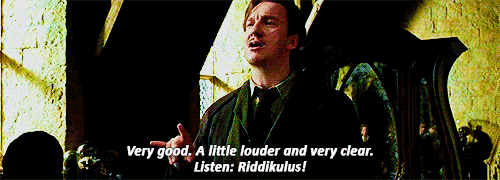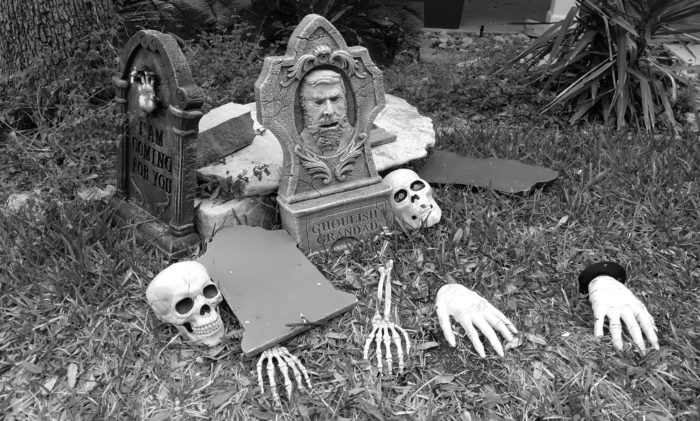Don’t Let Halloween Mock the Resurrection
Yes, it’s okay for Christians to celebrate Halloween.
These days the occasion has mostly become Fan-o-ween anyway. Kids and grown-ups alike can feast and celebrate stories, scary ones and otherwise. Some people may be tempted to indulge in occult activities, and yet most Christians really aren’t. Being “offended” or fearful is not the same as actual temptation to you personally.
But.
Even after I’ve spent many years of spiritual maturing, Gospel-embracing, and legalism-hatred, Halloween still makes me nervous.
I don’t mean the candy-and-costumes part. I don’t even mean the emphasis on scary story tropes and creatures. After all, horror is a story genre that can prove redemptive. This is especially true when authors use horror to truly illustrate the horror of man’s condition apart from Christ—or the horror of evil spiritual realities apart from Christ.
Instead I’m thinking of two ways Halloween bothers me. These two particular methods are very different. But people (or the Devil, or somebody) have found a way to do both at once.
1. People wrongly make light of the darkness.
 Christians are set free from bondage to sin and Satan. We can celebrate this freedom.1 In one sense, even as we guard against Satan and his lies, we can even laugh at the Devil’s attempts to scare us:
Christians are set free from bondage to sin and Satan. We can celebrate this freedom.1 In one sense, even as we guard against Satan and his lies, we can even laugh at the Devil’s attempts to scare us:
The gospel reveals that much of the fear that Satan excited in men prior to the advent of Christ resulted merely from the exaggerated shadows that he cast in the darkness. Now that light has come the shadows are removed and Satan is reduced to a far less terrifying stature. We can begin to laugh at the shapes that we once saw in the shadows.2
Non-Christians can’t do this because they don’t have the Christian’s freedom.
But with much of today’s Halloween celebration, they try anyway. They make decorations and movies based on terrifying creatures: zombies, spiders, wraiths, and the gravestones and skeletons. (Always the gravestones and skeletons—as if the very concept of dying, rotting away, and leaving nothing behind but a grinning set of remains isn’t terrible.)
People try to laugh at death. They try to make light of the darkness.
However, non-Christians have no cause to laugh. For anyone outside Christ, death and darkness are the greatest true fears. Without Him, we’ll end up nothing but headstones and skeletons at best. That’s not hilarious. It’s seriously terrifying. Mocking these truths is just as absurd and self-destroying as mocking the train speeding at you while you are tied to the tracks.
It’s not the laughter of a warrior who’s truly victorious over darkness and death.
It’s a laughter more like the Joker right before the amusement park explodes.
2. People exchange real light for ghoulish darkness.
Even as Halloween celebrations and decorations make light of serious terrors, these things can also cast glorious, beautiful truths as if they are horrific evils.

So Grandpa won’t come back as a glorified saint, but as a ghoul.
Picture the same decorative emphases on zombies, tombstones, skeletons, and ghosts. All of these are symbols of one Halloween idea: “the dead come back to life.”
In every instance, we’re led to conclude—not with thoughts, but with assumptions and feelings—that coming back from death is a terrible thing. If you do, you’ll be a skeleton. A zombie. You won’t be alive, but “undead.”
Taken by itself, this is a very real terror. If by some mystical or scientific means, people did return from the dead, that would be terrifying. Even worse, imagine if the body had already decomposed or if you were reduced to an animated skeleton or shambling corpse.
Now look what happens at the holiday opposite from Halloween: Easter, or Resurrection Sunday. Halloween occurs at fall, just before the world enters a season of decay leading to death. But on Easter Sunday at spring, heralding the season of new life, we celebrate the bodily resurrection of Jesus Christ. He did not merely become “undead.” He defeated death itself and was raised to life, the selfsame Person he was before he surrendered his life.
Yet in response to this truth, non-Christians mock the idea of Jesus’s resurrection. What do they say about him?
They can’t help but use Halloween imagery. They say, “ha ha, zombie Jesus.”
They assume the notion they’ve absorbed from horror tropes: that if you come back from the dead, it can’t be anything good. It’s terrible. It’s dark, evil, perverted.
All at once, the beautiful truth of the resurrection becomes a terrible fright.
The glorious promise Jesus and the apostles proclaimed, of real and permanent miraculous return from death to live forever in His kingdom, becomes a freak of magic or science.
Saints’ new Spirit-powered bodies 3 pulsing with divine light are mutated into corpses of rotting flesh.
Even the initialed, subtle promise of resurrection emblazoned on tombstones gets turned into a scary set of letters. Instead of “Rest in peace,” we get “RIP,” like the verb rip. Three of the most light-bringing words in the language are exchanged for a threat of darkness.
What then of Halloween?
We didn’t distribute candy to trick-or-treaters this year. That was a fluke; I forgot to buy candy. We won’t revert to a posture of legalism or fear against any holiday. Unlike our non-Christian friends, we can laugh at the darkness—and also help redeem the dark stuff.
But.
In years to come, I may push back against people’s ingrained habits to try making light of darkness. I may question whether we exchange real light—the hope of resurrection—for dark perversions of the concept, such as zombies and animate skeletons.
If anything, we simply need to ask these questions. For any holiday we celebrate, we should understand why we’re decorating and feasting and enjoying any other tradition.
So for Halloween, we might reasonably ask, “Can I put in my yard this plastic tombstone with ‘RIP’ ironically, or is there some part of me that suspects resurrection would be terrible?” Or, “Am I making light of death and horror because I’m strong in Christ and know that death has no ultimate power over me? Or am I trying to laugh away the real ghouls of evil that I suspect are still lurking out there in the world, ready to attack me any second?”
Don’t feast and celebrate at Halloween with any forced laughter at undefeated death. And don’t let suspicion of beautiful, miraculous Resurrection creep in either. Instead, recall the holiday’s roots: not to celebrate death, but celebrate the saints—saints who won’t return as undead ghouls, but as risen, glorified family and friends.
- This also means we’re bondservants to Jesus (1 Corinthians 7:22). He did not set us free for “freedom’s” sake. He loves us too much for that. Instead He sets us free for His sake, so that in living in service to Him we get the best pleasure in existence. ↩
- Of Boggarts, Alistair Adversaria, July 24, 2007. Quoted in “Casting The ‘Riddikulus’ Spell On Halloween,” E. Stephen Burnett at Speculative Faith, Oct. 27, 2010. ↩
- See 1 Corinthians 15. In verses 44-45, the apostle Paul says our new bodies will be “spiritual,” unlike our old bodies that were “natural.” Paul is not saying our new bodies will be ghost-like or non-material. He means that our new bodies will be empowered by the Holy Spirit. ↩






























It really does seem that your beef is against zombies. I mean, you referred to zombies as “Halloween imagery” as if they were exclusive to Halloween and, well, that’s precisely what would be required in order for that point about “zombie Jesus” to be valid.
Since zombies are not the exclusive property of Halloween, your argument and cautions would equally apply to speculative fiction and film. Are you prepared to aplly your cautions to horror media as well?
I personally detest Halloween. Not because of people wearing costumes and going out and asking for candy. I think that part can be innocent fun. I like dressing up! I love candy! I detest Halloween because of all the darkness and grossness of it. Why on earth would you want to put up tombstones in your yard? Or skeletons? Or something bloody? Why zombies? What good comes out of that? Halloween in general makes light of death and darkness. Even as Christians, it’s not something to make light or fun of. Fear? No. We have no reason to fear if God is on our side. Making light of it, laughing about it and perhaps mocking Satan in the process? As Christians, I still find that wrong. I don’t ever see God in the Bible making fun of death and Satan. In fact, He warns us about doing such things. It’s a serious matter and nothing to smirk at. For me, there’s always a sigh of relief when Halloween is done and the Christmas decorations in stores go up. It’s literally trading darkness for light and goodness.
Elijah. Mount Carmel. Baal gets mocked pretty hard. Beelzebub (a generally agreed upon synonym for Satan) is associated with the Canaanite god Baal. I get the part about not speaking evil of dignities, but Elijah’s example still stands against a strict prohibition against mocking the devil. Context is important.
Also Christmas is exactly as over commercialized as Halloween. Hence the admonitions to Put Christ back into Christmas and Keep Christ in Christmas. It’s all what you make of it
I respectfully disagree. Elijah himself mocked Baal. It doesn’t say “The Lord says,” before Elijah went on mocking. I doubt everything that Elijah said came from God’s mouth. Elijah was quite human. An incredible human but human the same. In what context is it okay to mock? What would justify that? It’s a dangerous game; one I don’t think we should play. We shouldn’t be afraid of death or Satan but they are not something to be mocked in any context, in my opinion.
Halloween’s problem isn’t being over commercialized. It’s the celebration of death. The decorations itself speaks for what the problem is. But if Halloween was just dressing up as your favorite superhero be and going out and candy, I’d be all for it. I will concede Christmas celebrated by the secular world does have its problems, but I don’t think you need less presents, a smaller tree, less decorations, and a worse house to appreciate the spiritual aspect of celebrating Christmas. We just need to remember Christmas for what it truly is.
We’ll probably disagree but that’s okay. I enjoy these type of discussions.
Elijah famously mocked the false god Baal during his famous contest on Mount Carmel. Many preachers have painted Baal as a satanic religion. Where does the Bible warn us specifically not to mock death or Satan?
Notwithstanding the point you try to make (what good does it do?) falls flat. Bram Stoker infused Christianity into Dracula, a tale of a satanically animate, bloodsucking corpse. The horror and grotesqueness of Halloween displays reminds me that the horrors of death and the grave are real, and any hope of resurrection apart from Christ is equally horrifying. The horrors of a world steeped in original sin yet unfettered by the restraint of the Holy Spirit are on display in the form of serial killers and slasher flicks. Above all else, Halloween reminds us that the supernatural is very, very real, something we amplify by a holiday that protests too much that it’s all superstition and Hollywood storytelling. As one of my children once said, If the Devil is real, then there must be a God.